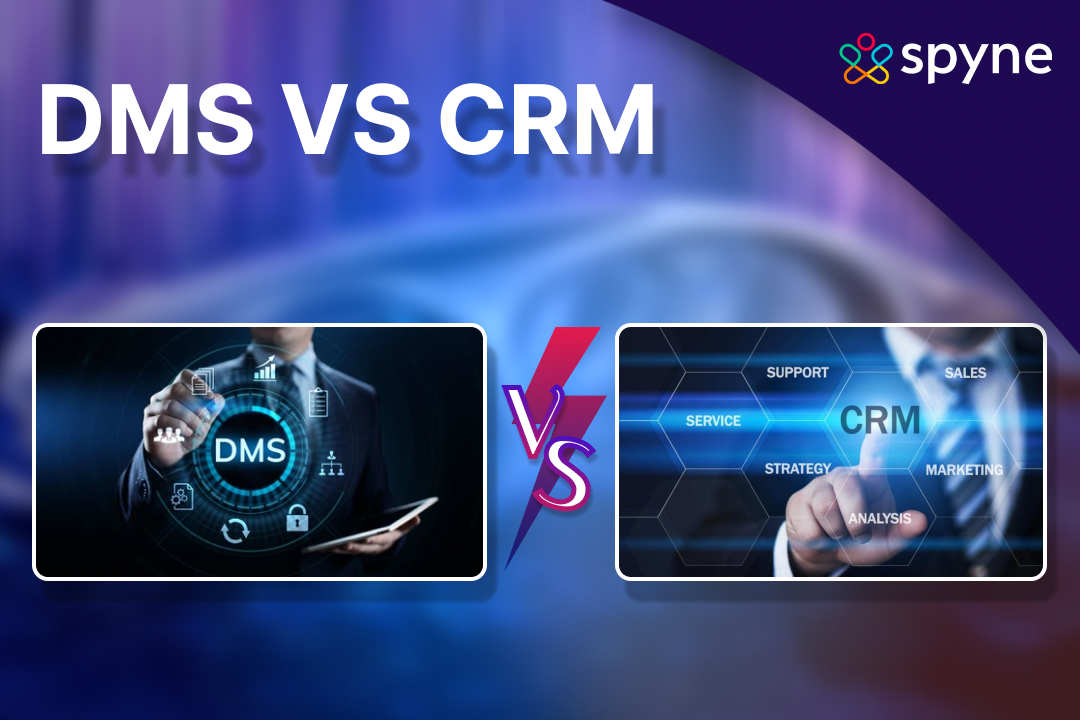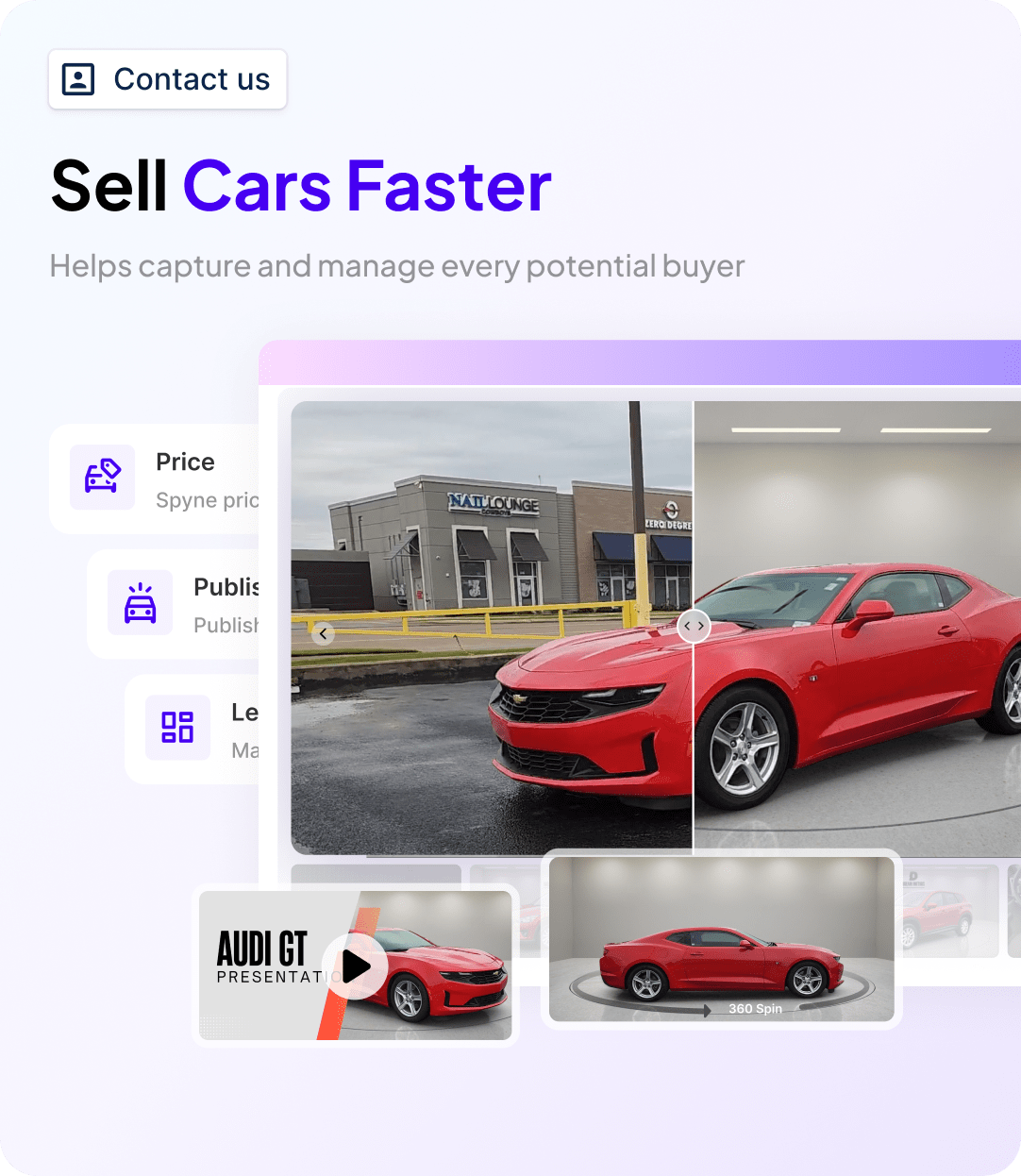Car dealerships use management software like CRM and DMS, which helps them provide an exceptional customer experience during the car buying journey. Car dealerships focus on providing satisfied services to customers. Therefore, satisfied customers are more likely to revisit the dealership and spread positive word of mouth. But why do you need both Automotive DMS and CRM? What is the difference between both? Check out our informative blog on DMS vs CRM to find the answers to your questions.
What is Automotive CRM Software?
An automotive CRM (Customer Relationship Management) software solution helps automotive companies with sales, customer service, and marketing. CRM allows auto dealerships to coordinate a multi-channel sales operation, collect leads, foster and nurture deeper customer relationships, and improve their customers’ journeys. CRM automobile helps businesses revolutionize themselves. Therefore, the CRM market grew to 10% even during the pandemic. Auto companies observed improved conversion and retention rates, better access to customer data, and increased profits and revenue after the integration of car dealership CRM software. Generally, the CRMs are integrated with DMS that already exist to put an end to the need for duplicate entry of customer data.
What are the 3 Main Types of CRM Systems?
Automotive CRM helps car dealerships communicate with customers and create long-lasting, healthy relationships. The system analyzes and manages customer data and interactions to increase sales growth and improve customer service and retention. Additionally, car dealer CRM systems have expanded their number of tools and functions. Therefore, before purchasing a CRM system, it is essential to understand the three types: operational, analytical, and collaborative. This will help you know which CRM best suits your business.
Operational CRM
Operational CRM blends all business processes, such as sales, marketing, and customer service. It streamlines several processes for customer relationships and helps them apply them to the central business process. Further, it generates leads, converts them into contacts, and provides the service required to retain customers. It uses a shared platform and stores information on employees, leads, and customers to support business clients.
1) Marketing Automation: It helps car dealerships decide the most effective channels to target customers, such as phone calls, emails, and social media ads. Therefore, automation allows you to find the best way to approach your customers using campaign management modules.
2) Sales Automation: It organizes information to help car dealerships to increase sales and meet customers’ needs. Therefore, it includes various modules like contact management, lead management, and sales forecasting.
3) Service Automation: Service automation is the connection point between service teams and customers. Its functionality includes setting up inboxes aggregated with customer emails, setting up chatbots, and coordinating live chats. With ticketing systems, it also delegates service tasks to reps and includes FAQ pages as additional features.
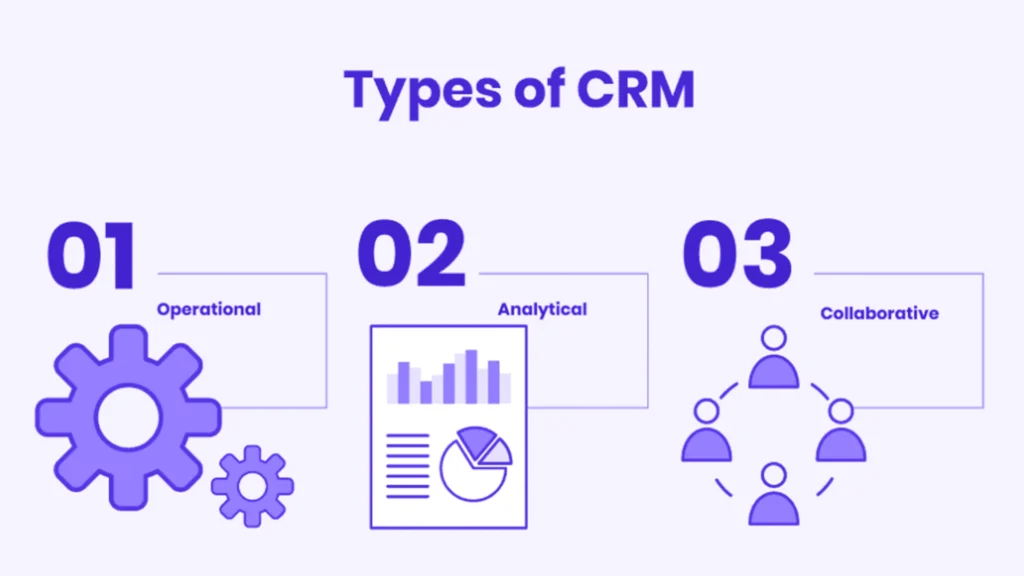
Analytical CRM
Analytical CRM helps dealerships turn large amounts of data into actionable insights to improve customer experiences. Data can include channels, customer preferences, trends, touchpoints, forecasting, etc. Therefore, it helps devise strategies to increase customer retention, develop new leads, and create efficiency for car dealership marketing and sales departments. However, the analytical CRM system is technical and needs a dedicated staff to understand.
Analytical automotive CRM systems are best for large and mid-size dealerships, as they can gather large amounts of data and refine it into insights and trends.
Collaborative CRM
Collaborative CRM, also known as strategic CRM, helps create a hassle-free customer experience by bridging the gap between departments and teams. It allows different departments in an organization to share customer information. Therefore, it helps the team make customer relationship management decisions from similar data and create a holistic approach. Collaborative CRM primarily focuses on customer service. At the same time, operational automotive CRM tools focus on sales and marketing. Collaborative CRM systems have two major components.
1) Interaction Management: It tracks touchpoints through numerous communication channels between a business and its customers. It also ensures that customers are not over-communicated by managing and monitoring each exchange. Over-communications might cause customers to block all forms of business.
2) Channel Management: It gathers information from interaction management to identify the best communication channel for a particular customer. It improves the information shared between marketing, sales, and customer support departments.
What is a (DMS) Dealer Management System?
DMS automotive meaning is to allow dealerships and service shops to manage their day-to-day operations. This includes their dealership encounters such as service operations, financing operations and sales operations among others. Car DMS uploads all the vehicle inventory on various platforms and includes tools for sales, finance, customer information management, vehicle inventory, and credit reports. Additionally, it contains tools for parts inventory, sales, administration, and service. When the process is centralized, the dealer management system increases efficiency and provides better interdepartmental cooperation.
What Does a DMS Do?
DMS automotive software enables dealerships to perform day-to-day functions. It encounters financing operations, sales operations, service operations, etc. All these dealership functions must work together. By combining all the required tools into a single platform, dealers can improve their businesses in each facet. A single platform allows you to manage your inventory, view service history, create point-of-sale invoices, and follow up on leads.
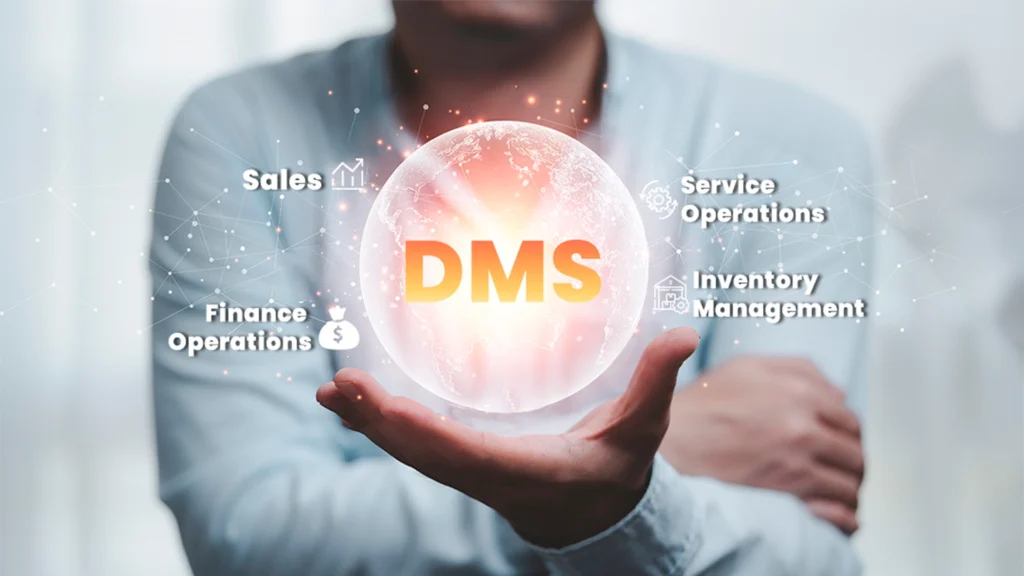
Why is DMS Required?
Every automotive dealership can benefit from having a DMS. Anyone at a dealership, including accountants, service managers, technicians, and more, can boost productivity and efficiency. A DMS reduces inefficiencies between different apartments and manages all aspects of the business, including sales, services, finance, IT, or parts. Dealerships who are expanding their business and spending several hours finding the problems. DMS solutions can help them increase efficacy and resolve complex problems efficiently and swiftly.
What is the Relationship Between Automotive DMS and CRM?
Businesses need a DMS to effectively use the information provided by auto dealership CRM software. A CRM system collects loads of data about clients in the form of surveys, emails, call records, notes, and more. Further, employees generate new sales contracts, add specific sales to orders to customer files, and find existing paperwork when selling to existing customers or finding new ones. A DMS allows employees to store and find customer documents and details easily and eliminates unnecessary efforts and time spent on non-productive tasks.
If employees switch platforms (jump from DMS to CRM) to find details when dealing with customers, it can take a lot of time, and they might lose focus. A longer response time will cause the customers to lose interest, and dealerships will lose customers. That is why integrating DMS with CRM is essential for automotive dealerships to improve work efficiency.
What is the Difference Between Automotive CRM and Automotive DMS?
Automotive CRM and DMS work best when integrated. This allows dealerships to have a seamless flow of information between sales, service, and automotive marketing, leading to a more positive customer experience and a more profitable dealership. We have mentioned the difference between automotive DMS vs CRM below.
| Automotive CRM | Automotive DMS |
| CRM centralized the dealership’s business by automating customer interactions and outreach while tracking customer journeys. | DMS streamlines and centralizes automotive business operations by organizing documents, from scans and contracts to text files and emails. |
| CRM collects and organizes the data into a tidy package, including customers’ purchasing information, interaction with ads, or getting help. | DMS allows employees with easy and quick access to the documents. Therefore, it helps salespeople to close the deal quickly and efficiently. |
It helps manage interactions with leads and existing customers throughout their buying experience. This includes:
|
It focuses on the internal dealership operations and manages the day-to-day tasks and data essential for running a dealership smoothly. This includes:
|
Why Should You Use CRM and DMS Together?
CRM and DMS should be used together to increase the efficiency of your business and make its output more effective. Using CRM and DMS together saves a lot of time and money while also improving customer interactions. When you integrate a DMS into your CRM it saves you the time spent on hunting down contracts and makes it easy to access the necessary documents by reorganizing itself into a centralized library that stores all your documents that are related to customers. Other reasons why you should use them together include:
1) Allows Salespeople to Focus on Selling: When sales teams work within a CRM, they can focus on generating new business rather than being bogged down with paperwork.
2) DMS CRM Integration Minimizes Wasted Time: Integrating a DMS with your CRM makes sure that your salespeople are not hunting for paperwork or duplicating efforts outside the CRM. Even saving a few minutes per transaction adds up over time.
3) CRM is Essential for Growth: CRM is used for tracking customer interactions, managing leads, and driving sales and this is crucial for growth.
4) DMS is Crucial for Office Efficiency: DMS is key for constructively managing information and it also aids in organizing your documents effectively.
5) Go Paperless with DMS: Moving to a paperless office using DMS improves your efficiency by reducing the time spent searching for documents.
6) CRM DMS Software Connects and Centralizes Business Data: A DMS links sales data from your CRM with other internal data and centralizes all important documents and records thereby giving you efficient access to information in one place.
Benefits of Using Automotive CRM and DMS Together
DMS is an important office solution for information management, and CRM is necessary for your business. Employees who work only within CRM for companies and generate new leads are the best they can do. However, if your automotive dealership and its salespeople integrate desk manager DMS with CRM, they can save time on each transaction.
1) Find new customers: It allows them to find new customers without collecting new paperwork outside CRM and hunting down paperwork.
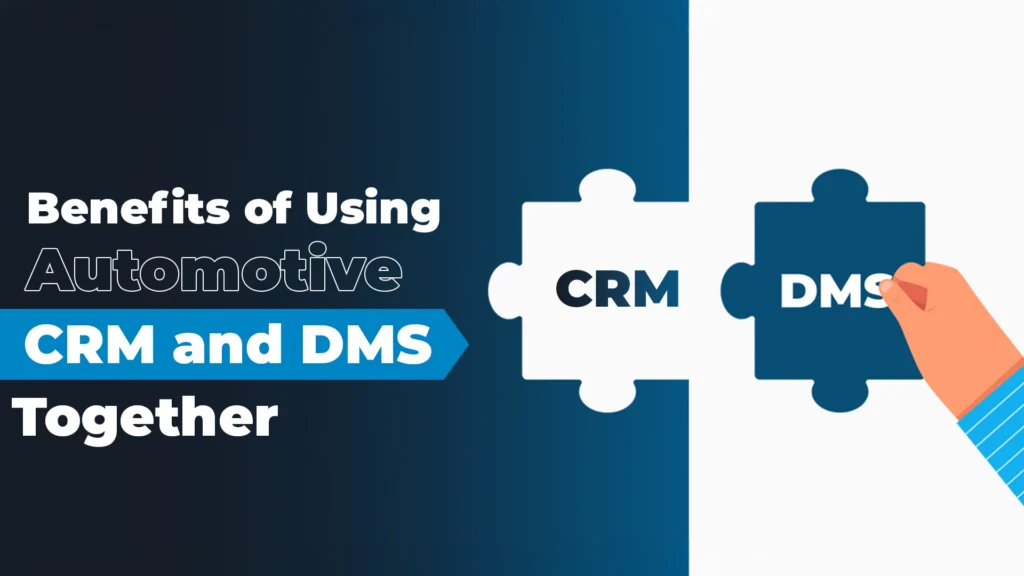
2) Dealership Efficiency: DMS can help dealerships fill the loopholes, regardless of whether the company uses CRM. Choosing the right automotive DMS and CRM together can improve dealership efficiency.
3) Organize Documents: DMS helps dealerships record and organize all important documents. Therefore, it helps salespeople search for required documents swiftly and save time finding files on computers, filing cabinets, or emails. CRM provides essential sales data, while DMS collects financial data and internal information.
How Do DMS and CRM Work in the Same Distributed Businesses?
Distribution Management Systems and Customer Relationship Management software work together in distributed businesses to save time and money and make operations more efficient and streamlined. CRM paints a complete picture of your customers and guides you on the actions you need to take next while DMS lets you perform those actions. So, you can work with a CRM to make sales while the DMS speeds up the process by providing you with contracts and other needful paperwork.
1) Cloud-based DMS Provides Seamless Accessibility: DMS operates on a cloud platform which enables businesses to access critical data from any internet-connected device. This feature offers you operational stability across multiple locations within a distributed business.
2) Real-time Data Synchronization: DMS stores and updates data on centralized servers and provides real-time access to customer and business information. This improves the decision-making and coordination across departments in distributed enterprises.
3) Key Stakeholders in Operational Workflows: The primary users consist of manufacturers, distributors, and sales personnel. The sales teams update customer data in real-time and facilitate efficient communication across multiple locations.
4) Streamlined Inter-departmental Communication: The DMS promotes standardized processes and transparent data sharing. These processes promote efficient collaboration which helps in maintaining smooth operations across distributed departments.
5) CRM Optimizes Customer Management: CRM systems store and manage customer data and enable businesses to track leads and nurture customer relationships more effectively.
6) DMS Improves CRM Functionality: In manufacturing and distribution, DMS supports CRM by managing distributor relationships, inventory, and point-of-sale data. This integration is of great benefit to sales teams as it provides them with real-time operational insights which improves decision-making.
Why is it Necessary to Integrate Automotive CRM with DMS?
Automotive CRM is a perfect library where all the necessary information is tidily arranged. CRM in automotive integration without DMS is like a vehicle without fuel. Auto dealer CRM software helps dealerships organize information about customer interactions and manage relationships. Meanwhile, DMS acts as a document storage and management system. It holds contracts, service records, and other crucial paperwork. Making use of a full DMS and CRM integration reduces labor hours by about 50% and reduces overall costs. The other ways in which integrating CRM with DMS can help you are:
1) Reduced Workload: Integration eliminates the need to manually search for information between separate systems, saving employees time and effort. A DMS tracks your documents and keeps them organized thus eliminating the need of labor-intensive processes and boosting productivity.
2) Improved Efficiency: Automated workflows can streamline tasks like sending documents. Your documents can be automatically organized and sent to where they need to go. Workflow Automation can also speed up processes like onboarding and training. This reduces delays and keeps things moving smoothly.
3) Cost Savings: Integration of DMS and CRM can significantly reduce costs by minimizing wasted time and resources. This integration saves you valuable minutes that would otherwise be spent organizing and maintaining documents, allowing you to focus on boosting sales and increasing revenue.
How Does an Automotive DMS and CRM Integration Work?
CRM helps dealerships collect customers’ information and tell employees what to do. It also helps salespeople sell more vehicles. Meanwhile, DMS automotive allows them to take the necessary action and provides the required paperwork and contracts to complete the process swiftly. Therefore, integrating CRM and DMS saves dealerships money and time and gives positive results. Find out how the integration works and how it can help your dealership below:
1) Workflow Automation
Traditional emailing documents and information is a method of communication. An integrated system allows an automated workflow, eliminating missing contracts and lag time. Car dealer CRM software automatically organizes and sends the documents to the right place. Exchange-heavy processes such as training and onboarding can be dramatically accelerated.
2) Cost Savings
CRM simplifies the process of finding and generating new customers. Meanwhile, automotive DMS integration helps eliminate the unnecessary time spent chasing documents. Therefore, it boosts the dealership’s sales and revenue. Additionally, saving time can significantly reduce the business’s costs.
3) Saves Time on Manual Data Copy-paste
DMS cars allow dealerships to keep their documents organized. However, filling them out still requires a manual process. CRM system integration offers document templates that can be auto-filled with the correct information. Therefore, with this integration, a manual copy-paste is no longer required.
4) Centralization of Business Processes
DMS takes the documents of your business and optimizes them by organizing them in an accessible repository that is easy to manage. Meanwhile CRM centralizes your business’ information such as customer interactions. CRM also tracks customer data and their journey that includes customer purchases and their interactions with ads and it consolidates this data into one package.
Conclusion
Automotive CRM vs DMS automotive software has different offerings to streamline the business process. However, their integration helps car salespeople speed up interactions and customer communications. Additionally, it eliminates the time-consuming haggling of finding and organizing the necessary documents. This saved time can help employees focus on essential tasks, streamline their strategies, and close more deals. Integration of both software can improve business workflow efficiency. However, it is important to research the best automotive CRM software and DMS type that suits your business.

